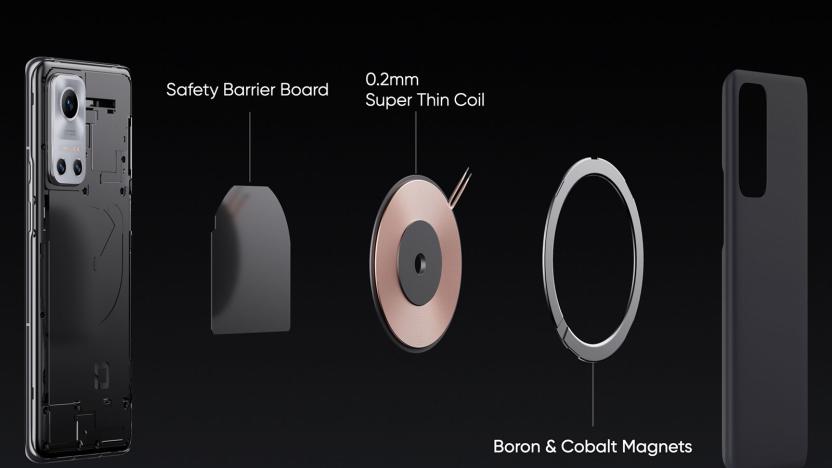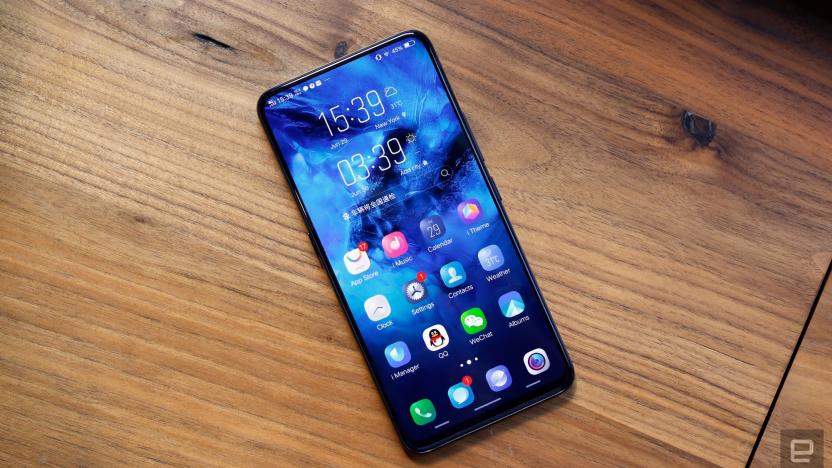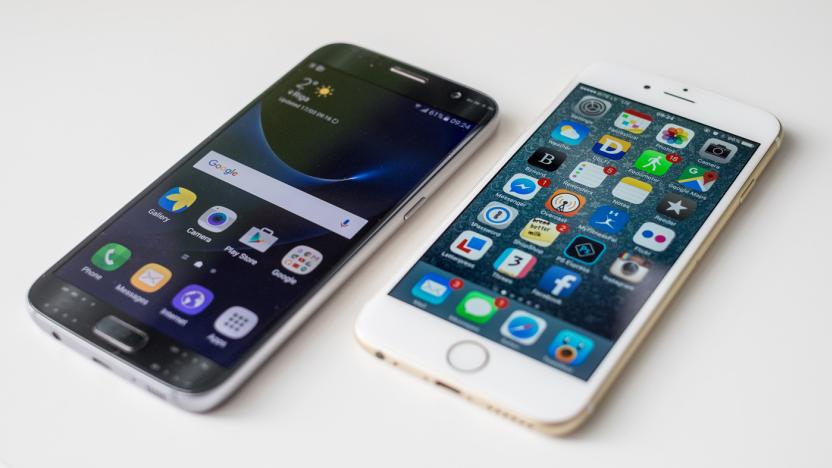BBK
Latest

Realme's latest flagship phone apparently feels like paper
Realme's flagship GT 2 Pro features an eco-friendly bio-polymer material on its back cover, with Muji design icon Naoto Fukasawa adding a textured paper feel.

Realme's 'MagDart' is an Android take on MagSafe, but faster
Realme, the sister brand of Oppo and OnePlus, has announced its very own "MagDart" magnetic wireless charging system, which is essentially the Android version of iPhone's MagSafe.

Vivo's all-screen NEX S is a frustrating glimpse of the future
More than anything, Vivo's NEX S is a fascinating machine. From a distance, it seems like any other big-screened smartphone. Look more closely, though, and the ambition becomes strikingly clear. An in-display fingerprint sensor? A pop-up selfie camera? This is no ordinary phone. I've been using it for a few days now -- or trying to, anyway -- and it's an excellent example of a Chinese company embracing new technologies and taking risks. That said, if you were thinking about importing one from China for the sheer novelty of it all, you should really hold off.

China's smartphone market sees its largest drop in five years
There's no question that China's smartphone industry is in a tough spot, but it's apparently worse than expected. Canalys has estimated that smartphone shipments in the country plummeted 21 percent year-over year in the first quarter of 2018 -- the steepest drop since 2013. Almost everyone saw their shipments go down, with Oppo and Vivo (both owned by BBK) taking the worst hit with a 10 percent drop. Gionee, Meizu and Samsung shipped less than half as many devices. Even Huawei, the clear frontrunner, grew by a mere 2 percent.

China's smartphone market shrinks for the first time in 9 years
For a while, it seemed like the Chinese smartphone market was an infinite growth machine. Companies would have rough patches, but the overall field would always be on the up and up. Well, those days are over. IDC estimates that Chinese smartphone shipments declined 4.9 percent in 2017 -- the first drop since 2009. The analyst firm pinned it primarily on "minor upgrades" to Chinese phones that weren't enough to spur a wave of new buyers. We'd add that the market is maturing. Much of the rapid growth from past years was sparked by a burgeoning Chinese middle class buying its first smartphones. Many of the people who could afford smartphones have them, and they aren't always in a rush to upgrade.

BlackBerry's share of the smartphone market is virtually zero
BlackBerry may be hoping for a recovery in its smartphone business, but it's hitting rock bottom right now. Gartner analysts estimate that BlackBerry's once-dominant platform hit 0.0 percent market share in the fourth quarter of 2016. Yes, zilch. The company did ship 207,000 phones, but that gives it less than half the unit volume of the "other OS" category. This wasn't hard to see coming given BlackBerry's years-long decline, gradual shift toward Android and recent focus on services. It's still incredibly symbolic, however, and shows that the company's deal with TCL effectively amounts to starting from scratch.

Apple builds an R&D center in China to survive a tough market
There's no question that China isn't as much of a money maker for Apple as it once was. However, it's not about to quit the country -- if anything, it's settling in for the long haul. The company has unveiled plans to build a Chinese research and development center by the end of the year. Just what it'll work on isn't evident at this stage, although it's part of an overall increased investment in Apple's second-largest market.

Fitbit's lead in the wearable world shrinks due to newcomers
Fitbit has ruled the wearable roost for a while, but it's clear that the activity tracker maker can't become complacent. IDC has released estimates which show that Fitbit lost a significant amount of market share in the first quarter. While its shipments were up 25.4 percent (to 4.8 million), its share plunged from 32.6 percent a year ago to 24.5 percent at the start of 2016. Simply put, the market is much more crowded than it was a year ago -- it has to contend with the Apple Watch, China's BBK and Lifesense, as well as a slew of smaller brands jumping into the field.

The smartphone market is peaking
It's not just Apple taking a tumble in the smartphone market, apparently. IDC has published estimates for first quarter market share which not only suggest that shipments are virtually flat (up a mere 0.2 percent), but that the mobile landscape is changing rapidly. While Apple was the only company in the top five manufacturers to see a big hit, Samsung shrank slightly as well... and even the Chinese contingent is shaking things up a bit. Huawei is still sitting comfortably in third place, but Lenovo and Xiaomi are out of the top ranks -- instead, it's the popular but not-quite-household names like Oppo and Vivo (both owned by BBK) that are storming up the charts.

Vivo X3 smartphone stuffs air gestures and high-end audio into a 5.75mm-thick shell (video)
Did you think Huawei's Ascend P6 was a slim smartphone? It has nothing on BBK's just-unveiled Vivo X3. Despite a 5-inch (if 720p) screen, an 8-megapixel rear camera, a front 5-megapixel shooter and a 1.5GHz quad-core MediaTek processor, the X3 measures a wafer-like 5.75mm thick in its blue variant. There's plenty of party tricks under the hood, too -- the Android 4.2 device has both an infrared sensor for touch-free gestures and a dedicated audio chip from ESS. It also preserves much of the better hardware from its slower and thicker X1S cousin, including the 16GB of non-expandable storage and the 2,000mAh battery. The Vivo X3 ships to China on September 1st for the same ¥2,498 ($408) as the X1S. If the device proves tempting, you can check out the Engadget Chinese hands-on; their English-language video is available after the break.

BBK Vivo X1 hands-on
Even though we focus a lot of our CES coverage on the biggest (read: flagship) products announced at the show, we revel in the opportunity to find the little gems scattered in various corners of Las Vegas that may not receive quite as much attention. One such product is the BBK Vivo X1, a phone that was recently launched in China but hasn't seen any time on this side of the Pacific. Up until this week, this particular piece of circuitry was the title holder for "world's thinnest smartphone," measuring in at 6.55mm thick. (The Alcatel Idol Ultra now claims this title at 6.45mm, although it's technically not on sale yet.) Despite the small package, it also professes to pack a hefty audio punch, boasting a pair of Beyerdynamic MMX 71 iE earphones and Cirrus Logic CS4398 DAC. We weren't able to test the audio prowess of the device in our brief interaction, but it felt reasonably good to hold in our hands overall. The Vivo X1 is one of the more sleek phones we've played with recently, but there's one piece of baggage that comes with that statement: it's slick. Our small concern with smartphones this thin is how well we can hang onto the ¥2,498 ($400) handset without dropping it on a regular basis, and its incredibly light chassis combined with its smooth plastic back add to that worry. At the very least, the 4.7-inch frame is easy to grip despite its slippery material. Spec-wise, you aren't looking anything out of the ordinary: a dual-core 1.2GHz MediaTek MT6577T processor and 1GB RAM help the phone get stuff done; it's powered by a non-removable 2,000mAh battery (rather large for such a slim phone) and offers a qHD IPS display, 16GB internal storage, a 3.5mm headphone jack, 8MP rear-facing camera and 1.3MP front cam. This device is geared primarily for China, so it's quite likely that we won't see it in many other parts of the world. But if you fancy a closer look at the Vivo X1, take a look at our extensive gallery of images below.

BBK's Vivo X1 is a phone for audiophiles, packs high-end DAC and Beyerdynamic earphones
We've never paid much attention to BBK's phones in the past, but today, this Chinese company -- who's actually the creator of the Oppo brand for the Western market -- announced a rather interesting Android 4.1 device. The idea of this Vivo X1 is that BBK wants to take audio very seriously on its new flagship phone, which is why it's been given a Cirrus Logic CS4398 digital-analog converter plus a CS8422 sample-rate converter -- a combo that's seemingly popular amongst Hi-Fi connoisseurs and manufacturers. And to match that audio performance, BBK's also throwing in a pair of Beyerdynamic MMX 71 iE earphones (20Hz-22kHz, 12Ω, 104dB) as part of the ¥2,498 ($400) package; though you can also choose the AKG K420 or the Sennheiser CX215 instead when buying from BBK's official online store. The rest of the Vivo X1, however, is more bog-standard in comparison: MediaTek MT6577T processor (1.2GHz, dual core, Cortex-A9), 4.7-inch 960 x 540 IPS display, 1GB RAM, 16GB built-in storage, eight-megapixel main camera, 1.3-megapixel front-facing camera and WCDMA 2100 3G radio. The only real highlight here is perhaps the 2,000mAh battery, which is non-removable but still rather impressive considering it's in a 6.55mm-thin body. Even the Oppo Finder has a 6.65mm thickness and yet lacks a 3.5mm headphone jack, whereas BBK's thinner phone has one. What's missing here is microSD expansion, but there's 15GB of Baidu cloud storage should users wish to take advantage of that. The Vivo X1 may just be available for pre-order now, but the folks at BBK couldn't help but tease the highlights of its next-generation device already: bezel-free design, 1080p display, big battery and 13-megapixel camera. We look forward to that.


